牛津译林版(2020)选择性必修第一册Unit2 The universal language Extended reading课件(共18张PPT)
文档属性
| 名称 | 牛津译林版(2020)选择性必修第一册Unit2 The universal language Extended reading课件(共18张PPT) |

|
|
| 格式 | pptx | ||
| 文件大小 | 3.5MB | ||
| 资源类型 | 教案 | ||
| 版本资源 | 牛津译林版(2019) | ||
| 科目 | 英语 | ||
| 更新时间 | 2024-04-18 00:00:00 | ||
图片预览

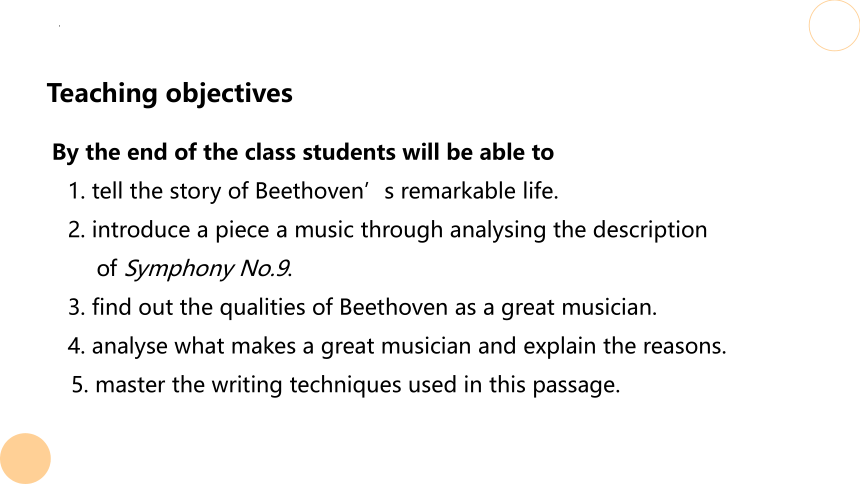
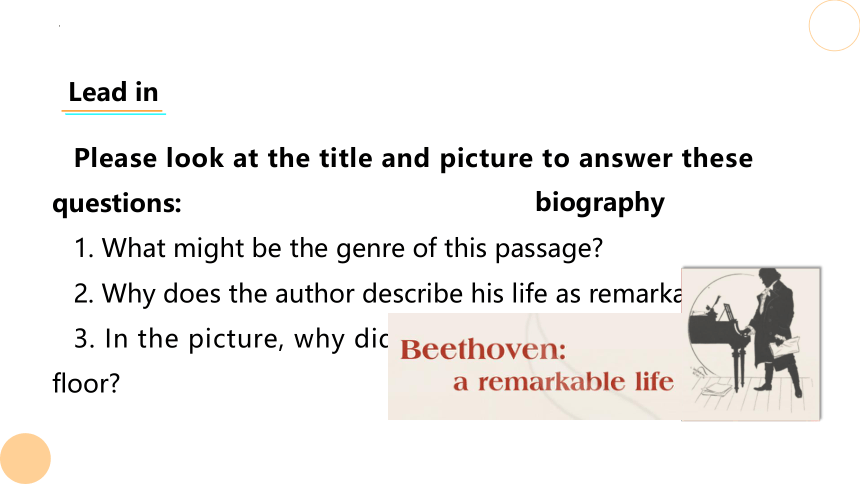
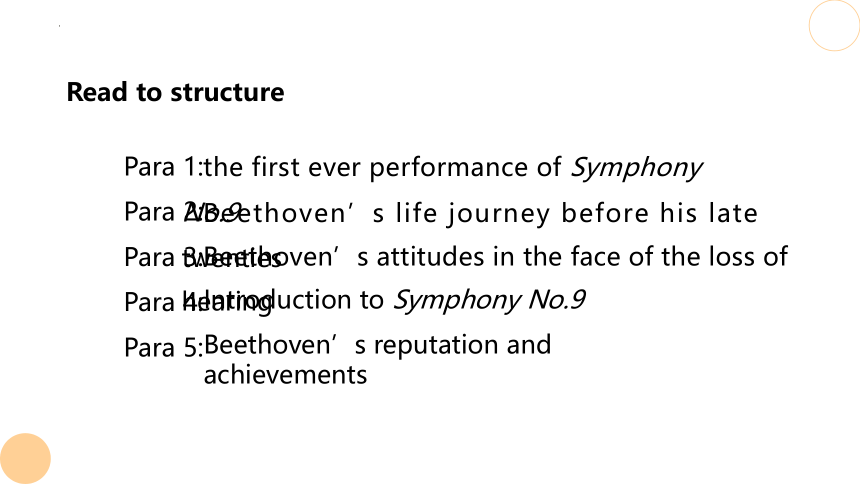
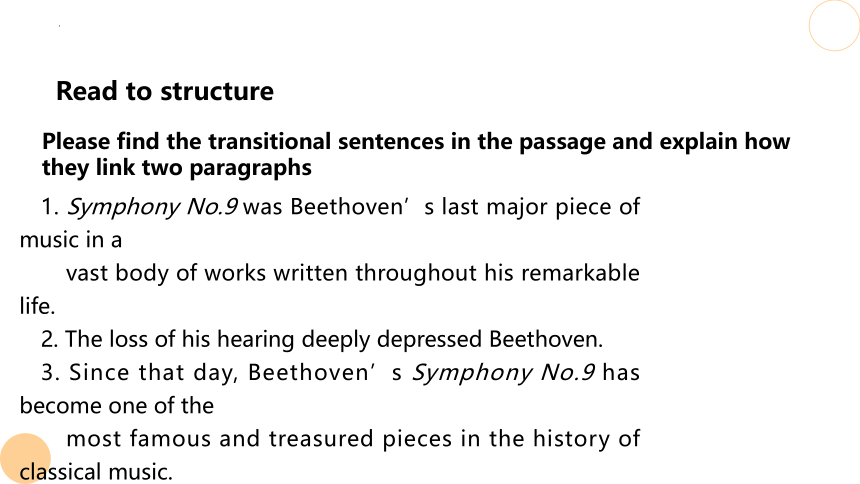
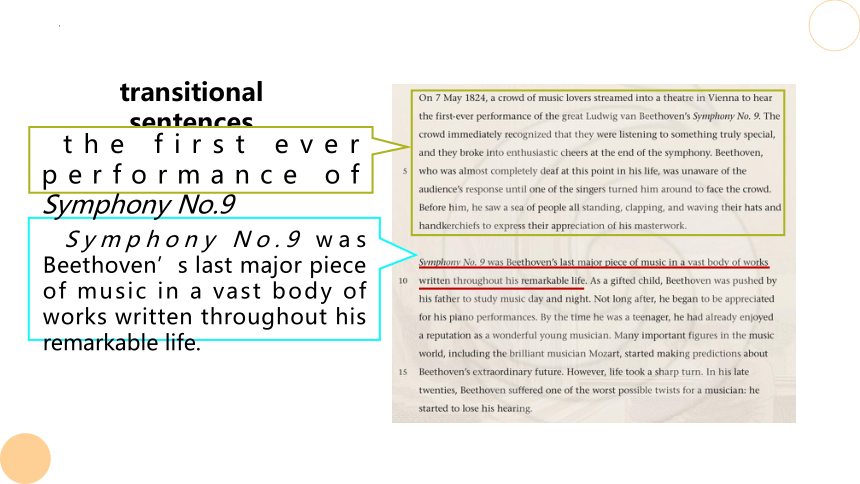

文档简介
(共18张PPT)
选择性必修一
Unit 2 Beethoven: a remarkable life
(Extended Reading)
Teaching objectives
By the end of the class students will be able to
1. tell the story of Beethoven’s remarkable life.
2. introduce a piece a music through analysing the description
of Symphony No.9.
3. find out the qualities of Beethoven as a great musician.
4. analyse what makes a great musician and explain the reasons.
5. master the writing techniques used in this passage.
Lead in
Please look at the title and picture to answer these questions:
1. What might be the genre of this passage
2. Why does the author describe his life as remarkable
3. In the picture, why did he left some papers on the floor
biography
Read to structure
Para 1:
Para 2:
Para 3:
Para 4:
Para 5:
the first ever performance of Symphony No.9
Beethoven’s life journey before his late twenties
Beethoven’s attitudes in the face of the loss of hearing
Introduction to Symphony No.9
Beethoven’s reputation and achievements
Read to structure
Please find the transitional sentences in the passage and explain how they link two paragraphs
1. Symphony No.9 was Beethoven’s last major piece of music in a
vast body of works written throughout his remarkable life.
2. The loss of his hearing deeply depressed Beethoven.
3. Since that day, Beethoven’s Symphony No.9 has become one of the
most famous and treasured pieces in the history of classical music.
4. As Beethoven’s last great work, his Symphony No.9 was also a
grand finale to his life.
transitional sentences
Symphony No.9 was Beethoven’s last major piece of music in a vast body of works written throughout his remarkable life.
the first ever performance of Symphony No.9
The loss of his hearing deeply depressed Beethoven.
transitional sentences
Since that day, Beethoven’s Symphony No.9 has become one of the most famous and treasured pieces in the history of classical music.
Introduction to Symphony No.9
transitional sentences
As Beethoven’s last great work, his Symphony No.9 was also a grand finale to his life.
Introduction to Symphony No.9
transitional sentences
Read to structure
Q1: What might be the order of organising the passage
Is it exactly the order of time
Q2: Why does the author begin the passage with the performance of Symphony No.9
stress the importance of Symphony No.9
attract readers’ attention
……
As a gifted child
Not long after
As a teenager
In late twenties
studying music day and night
being appreciated for his piano performances
enjoying a reputation as a wonderful young musician
suffering the worst possible twist: gradual loss of hearing
Read to understand
Fill in the flow chart about Beethoven’s life journey.
Read to understand
Q1: How did he overcome the loss of hearing
He used a variety of hearing aids to try to increase the amount of sound he could take in. He would put one end of a pencil in his mouth and place the other end against the instrument so that he could feel the notes.
Q2: What makes his life remarkable
his amazing achievements and his determination even in his darkest days
movements features Beethoven’s feeling and conditions
the first movement It starts _______, but __ __ __ ______, the whole orchestra breaks into ___ ________ ______ the ____________ to overcome the hearing loss coursing through the music
2nd and 3rd movement full of ________ _____ and ________ ________ move through technically difficult sections ____ ____ reflect both his _______ and his strong ____ to fight it
show his ______ as a composer
the fourth movement connect all of the different _________ into a _____ ______
quietly
all of a sudden
an
energetic
theme
desperate lows
uplifting
highs
with
ease
variations
joyful
chorus
determination
suffering
will
genius
Read to appreciate
Qualities of Beethoven
devotion
optimism
determination
talent
persistence
creativity
desire
diligence
intelligence
……
Critical thinking
Critical thinking
What do you think makes a great musician Make a list of the qualities and explain why they are important.
Talent: Having a talent for music can ensure they have a
good sense of music.
Creativity: Imagination and artistic vision allow a great musician to
create music that is unique.
Determination: A good musician must be able to get through those
darkest moments in order to achieve greatness.
Passion: Musicians must love what he or she is doing. They should regard
music not as a job or career, instead, as an important part of life.
Read to apply
The magazine “teens” is calling for contributions to the “my hero” column. Please write a passage introducing Beethoven. (80 words)
Beethoven, who lives a remarkable life, is one of my heroes greatly influencing my life. His diligence and persistence of studying music day and night won him a reputation and made him be appreciated by other musicians. Unfortunately, he suffered hearing loss in his late twenties, which once made him depressed and desperate. However, he tried a lot of methods. Eventually, he overcame this desperate situation and finished Symphony No.9, which use extraordinary technique to perform lows and uplifting highs to reflect his suffering, various virtues and genius as a composer.
Example:
Homework
1. Finish and polish the composition.
2. Work in groups and find another musician you are
interested in most and make a presentation in the next class.
选择性必修一
Unit 2 Beethoven: a remarkable life
(Extended Reading)
Teaching objectives
By the end of the class students will be able to
1. tell the story of Beethoven’s remarkable life.
2. introduce a piece a music through analysing the description
of Symphony No.9.
3. find out the qualities of Beethoven as a great musician.
4. analyse what makes a great musician and explain the reasons.
5. master the writing techniques used in this passage.
Lead in
Please look at the title and picture to answer these questions:
1. What might be the genre of this passage
2. Why does the author describe his life as remarkable
3. In the picture, why did he left some papers on the floor
biography
Read to structure
Para 1:
Para 2:
Para 3:
Para 4:
Para 5:
the first ever performance of Symphony No.9
Beethoven’s life journey before his late twenties
Beethoven’s attitudes in the face of the loss of hearing
Introduction to Symphony No.9
Beethoven’s reputation and achievements
Read to structure
Please find the transitional sentences in the passage and explain how they link two paragraphs
1. Symphony No.9 was Beethoven’s last major piece of music in a
vast body of works written throughout his remarkable life.
2. The loss of his hearing deeply depressed Beethoven.
3. Since that day, Beethoven’s Symphony No.9 has become one of the
most famous and treasured pieces in the history of classical music.
4. As Beethoven’s last great work, his Symphony No.9 was also a
grand finale to his life.
transitional sentences
Symphony No.9 was Beethoven’s last major piece of music in a vast body of works written throughout his remarkable life.
the first ever performance of Symphony No.9
The loss of his hearing deeply depressed Beethoven.
transitional sentences
Since that day, Beethoven’s Symphony No.9 has become one of the most famous and treasured pieces in the history of classical music.
Introduction to Symphony No.9
transitional sentences
As Beethoven’s last great work, his Symphony No.9 was also a grand finale to his life.
Introduction to Symphony No.9
transitional sentences
Read to structure
Q1: What might be the order of organising the passage
Is it exactly the order of time
Q2: Why does the author begin the passage with the performance of Symphony No.9
stress the importance of Symphony No.9
attract readers’ attention
……
As a gifted child
Not long after
As a teenager
In late twenties
studying music day and night
being appreciated for his piano performances
enjoying a reputation as a wonderful young musician
suffering the worst possible twist: gradual loss of hearing
Read to understand
Fill in the flow chart about Beethoven’s life journey.
Read to understand
Q1: How did he overcome the loss of hearing
He used a variety of hearing aids to try to increase the amount of sound he could take in. He would put one end of a pencil in his mouth and place the other end against the instrument so that he could feel the notes.
Q2: What makes his life remarkable
his amazing achievements and his determination even in his darkest days
movements features Beethoven’s feeling and conditions
the first movement It starts _______, but __ __ __ ______, the whole orchestra breaks into ___ ________ ______ the ____________ to overcome the hearing loss coursing through the music
2nd and 3rd movement full of ________ _____ and ________ ________ move through technically difficult sections ____ ____ reflect both his _______ and his strong ____ to fight it
show his ______ as a composer
the fourth movement connect all of the different _________ into a _____ ______
quietly
all of a sudden
an
energetic
theme
desperate lows
uplifting
highs
with
ease
variations
joyful
chorus
determination
suffering
will
genius
Read to appreciate
Qualities of Beethoven
devotion
optimism
determination
talent
persistence
creativity
desire
diligence
intelligence
……
Critical thinking
Critical thinking
What do you think makes a great musician Make a list of the qualities and explain why they are important.
Talent: Having a talent for music can ensure they have a
good sense of music.
Creativity: Imagination and artistic vision allow a great musician to
create music that is unique.
Determination: A good musician must be able to get through those
darkest moments in order to achieve greatness.
Passion: Musicians must love what he or she is doing. They should regard
music not as a job or career, instead, as an important part of life.
Read to apply
The magazine “teens” is calling for contributions to the “my hero” column. Please write a passage introducing Beethoven. (80 words)
Beethoven, who lives a remarkable life, is one of my heroes greatly influencing my life. His diligence and persistence of studying music day and night won him a reputation and made him be appreciated by other musicians. Unfortunately, he suffered hearing loss in his late twenties, which once made him depressed and desperate. However, he tried a lot of methods. Eventually, he overcame this desperate situation and finished Symphony No.9, which use extraordinary technique to perform lows and uplifting highs to reflect his suffering, various virtues and genius as a composer.
Example:
Homework
1. Finish and polish the composition.
2. Work in groups and find another musician you are
interested in most and make a presentation in the next class.
同课章节目录
- Unit 1 Food matters
- Welcome to the unit
- Reading
- Grammar and usage
- Integrated skills
- Extended reading
- Project
- Unit 2 The Universal Language
- Welcome to the unit
- Reading
- Grammar and usage
- Integrated skills
- Extended reading
- Project
- Unit 3 The art of painting
- Welcome to the unit
- Reading
- Grammar and usage
- Integrated skills
- Extended reading
- Project
- Unit 4 Exploring poetry
- Welcome to the unit
- Reading
- Grammar and usage
- Integrated skills
- Extended reading
- Project
